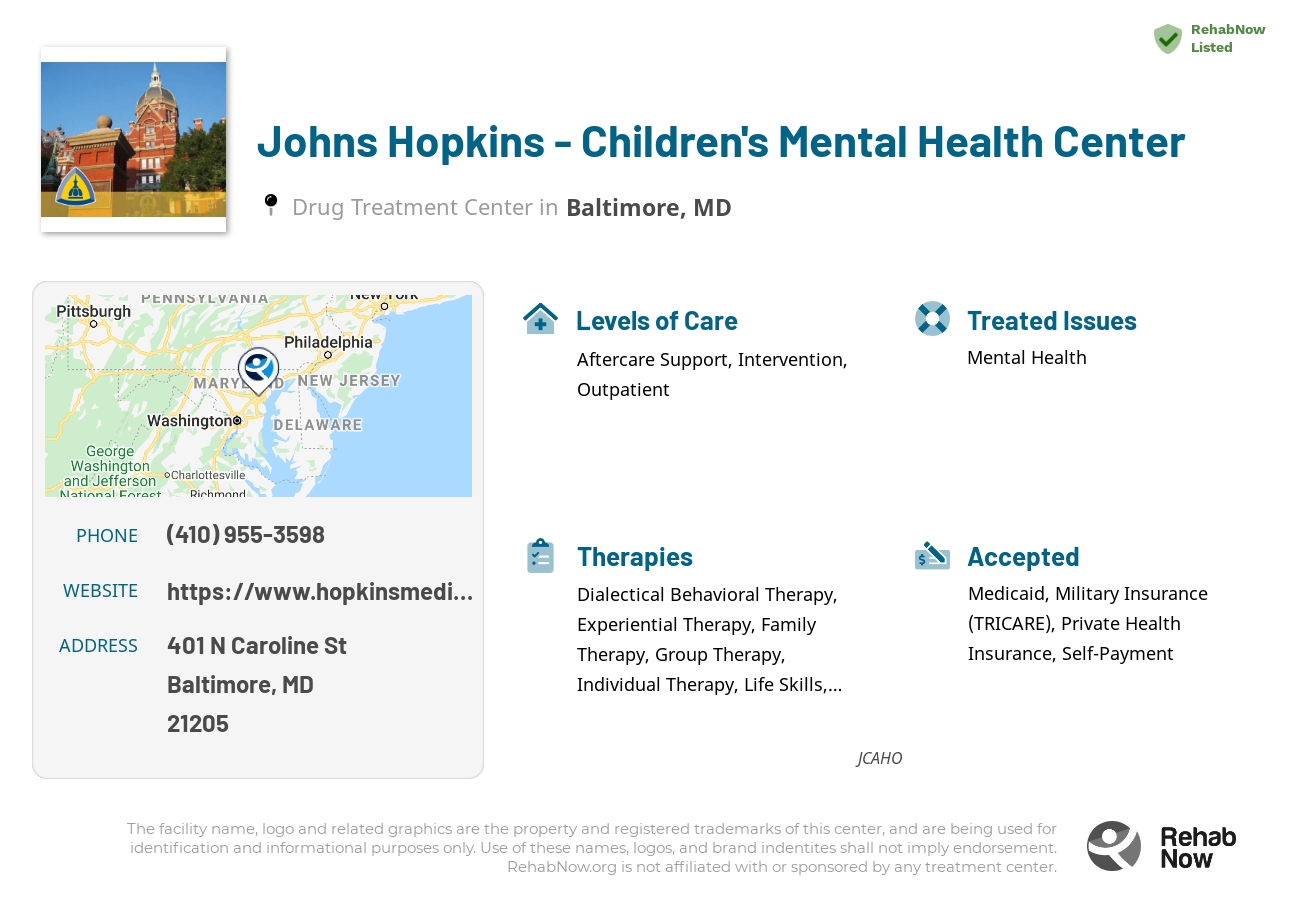Johns Hopkins - Children's Mental Health Center
Drug Rehab Center in Baltimore, Maryland
Johns Hopkins Health System - Children's Mental Health Center in Baltimore, MD is a reputable mental health treatment facility accredited by JCAHO that specializes in providing comprehensive care for individuals, particularly children, suffering from mental health issues, addiction, and substance abuse through evidence-based therapies, counseling, and personalized treatment plans.
About This Maryland Facility
Johns Hopkins Health System - Children's Mental Health Center is a reputable mental health treatment facility located in Baltimore, MD. The center is accredited by the Joint Commission on Accreditation of Healthcare Organizations (JCAHO), ensuring that it meets rigorous standards of care and treatment. Johns Hopkins Health System - Children's Mental Health Center specializes in providing mental health treatment for individuals, particularly children, who are suffering from various mental health issues. They offer a range of services, including aftercare support, intervention, and outpatient levels of care. Additionally, the facility is affiliated with Johns Hopkins, a renowned medical institution, which further exemplifies their commitment to providing high-quality and comprehensive care.
Johns Hopkins Health System - Children's Mental Health Center provides a variety of services to individuals struggling with addiction and substance abuse. These services are designed to address the unique needs and challenges faced by individuals affected by these issues. The center offers comprehensive treatment programs that incorporate evidence-based therapies, individual and group counseling sessions, and specialized support services. Through a holistic approach, they aim to support individuals in their recovery journey, helping them develop healthy coping mechanisms, improve self-awareness, and foster long-term sobriety. The dedicated and experienced staff at Johns Hopkins Health System - Children's Mental Health Center work closely with each individual to create personalized treatment plans that address their specific needs and goals.
Genders
Ages
Modality
Additional
Accreditations

JCAHO
Conditions and Issues Treated
Levels of Care Offered at Johns Hopkins - Children's Mental Health Center
This center offers a variety of custom treatment tailored to individual recovery. Currently available are Aftercare Support, Intervention, Outpatient, with additional therapies available as listed below.
Outpatient rehabilitation is a treatment that exists if a patient is not checking into Johns Hopkins - Children's Mental Health Center long term. In addition to helping them recover, the patient attends regular therapy sessions and detox and participates in other therapies. However, this is all primarily done from home. As a follow-up to inpatient treatment, outpatient treatment is usually recommended.
After rehabilitation, it helps people return to their everyday lives. It may also be an alternative to inpatient care in some situations. If they cannot leave their jobs, children, or don’t have the money for inpatient care, people can choose this method. Inpatient therapy, however, is the best method and most suggested level of treatment offered by Johns Hopkins - Children's Mental Health Center in recovering from addiction.
Intervention services are designed to help loved ones of an individual suffering from alcohol or drug addiction. They aim to help the individual realize that their behavior is causing damage, and external help is crucial to handle their problem efficiently.
Treatment for substance abuse does not cease after an individual successfully completes a detox or rehabilitation program. A vital follow-up treatment service is aftercare support provided to individuals at Johns Hopkins - Children's Mental Health Center in Maryland after they attain initial sobriety.
Aftercare support often takes the following forms: 12-Step Programs, Outpatient Treatment Programs, and Support Groups. The most effective aftercare programs are tailored to meet an individual’s specific needs and circumstances.
Therapies & Programs
Individual therapy involves one on one sessions between the patient and the therapist at Johns Hopkins - Children's Mental Health Center. Individual therapy provides patients with a safe environment where they can openly discuss their problems with the therapist. The patients find the therapist as a person who they can trust. It helps them to open up and discuss personal and sensitive issues, which they may not be comfortable discussing in a group setting.
Individual therapy aims to identify the core issues that would have led the patient to substance abuse and address the root cause effectively. The therapist can develop patient-specific customized solutions through individual therapy, which aids speedier recovery.
Recovery can be more effective if the entire family’s involved. Family therapy hosted by Johns Hopkins - Children's Mental Health Center brings in the addict’s family to explore genetic factors. It gives loved ones the tools for dealing with addiction and its underlying mental issues. It is a recommended step in helping addicts adapt to sober living.
Trauma is one of the most common causes of psychological disorders. It’s often found in people with addiction diagnoses. Trauma therapy addresses this by examining the emotions and thoughts people have formed due to past traumas. Traumas are complex but trauma therapy can reduce their ability to contribute to addictive behaviors.
Dialectical Behavioral Therapy is a form of Cognitive Behavioral Therapy. It is designed for those who are prone to self-harm and suicidal behaviors. Johns Hopkins - Children's Mental Health Center aims to help patients understand the relationship between their thoughts, feeling and behaviors and it gives them the tools to make a change. It is effective for those whose addictions and behaviors stem from extreme mental health issues.
Rehabilitation is not just limited to bringing an individual out of addiction and achieving sobriety. It is considered complete only when an individual starts leading a normal and balanced life. Life skill therapy focuses on the various skills that helps an individual to lead a normal life. Patients often do not take care of themselves, struggle professionally and withdraw from social interaction due to the physical and emotional disturbances caused by addiction.
Life skills therapy helps them to improve various personal, professional and social skills such as cooking healthy meals, maintaining proper hygiene, budgeting, decision making, time management, regulation of emotions and resolving the interpersonal conflicts effectively.
The right diet can improve a person’s general outlook, sleep habits and thought processing skills. MNT also lowers the occurrence of chronic diseases such as adult-onset diabetes. Dieticians like those at Johns Hopkins - Children's Mental Health Center in Baltimore, MD believe that nutrition therapy is the key to making significant lifestyle changes.
Nicotine Replacement Therapy (NRT) uses low dose nicotine products to ween smokers away from cigarettes. The products get nicotine into the bloodstream without smoking reducing addiction to the physical habit. It also allows addicts to adjust to lower doses to reduce withdrawal symptoms.
Patient Experience
Experiential Therapy at Johns Hopkins - Children's Mental Health Center
Experiential therapy involves recreating or creating new experiences for the patient. Many people struggled with past issues such as memories or trauma. By creating a new experience, it allows people to work through the issues associated with those moments in a new experience. This can give them a new measure of control and can help them role play a new scenario. That can help push addiction into their past and help them begin the healing process.
Payment Options Accepted
For specific insurance or payment methods please contact us.
Is your insurance accepted?
Ask an expert, call (888) 674-0062
Johns Hopkins Associated Centers
Discover treatment facilities under the same provider.
- Johns Hopkins Broadway Center for Addiction - Wilson House in Baltimore, MD
- John Hopkins Broadway - Bloomberg Children's Center in Baltimore, MD
- Johns Hopkins Bayview Medical Center - Creative Alternatives in Baltimore, MD
- John Hopkins Broadway - Broadway Campus in Baltimore, MD
Learn More About Johns Hopkins Centers
Additional Details
Specifics, location, and helpful extra information.
Baltimore, Maryland 21205 Phone Number(410) 955-3598 Meta DetailsUpdated November 25, 2023
Staff Verified
What else do people call Johns Hopkins – Children’s Mental Health Center?
People have occasionally also searched for “John Hopkins - Children's Mental Health Center in Maryland”
Patient Reviews
There are no reviews yet. Be the first one to write one.
Baltimore, Maryland Addiction Information
For the past decade, Maryland's rate of drug use and abuse has significantly increased. The overdose rate is currently higher than the national average. This epidemic is due to the many industries where manual labor is required. As soon as prescription opioids were more readily accessible a large part of manual workers started using–and eventually abusing–the painkillers.
According to recent statistics, there are around 33,000 people who are addicted to drugs in Baltimore. Heroin-related overdose deaths are quite high in Baltimore, at 837 per 100,000 residents in 2016. Baltimore's most commonly abused drugs include heroin, cocaine, and marijuana. The people of Baltimore are friendly and welcoming, and there's always something going on. If you're looking for a place to start fresh, Baltimore is the perfect place.
Treatment in Nearby Cities
- Ocean City, MD (105.1 mi.)
- Millersville, MD (16.7 mi.)
- Hunt Valley, MD (13.9 mi.)
- Havre De Grace, MD (32.2 mi.)
- Linthicum Heights, MD (6.9 mi.)
Centers near Johns Hopkins - Children's Mental Health Center
The facility name, logo and brand are the property and registered trademarks of Johns Hopkins - Children's Mental Health Center, and are being used for identification and informational purposes only. Use of these names, logos and brands shall not imply endorsement. RehabNow.org is not affiliated with or sponsored by Johns Hopkins - Children's Mental Health Center.










